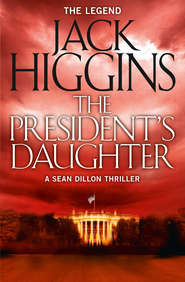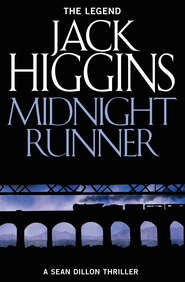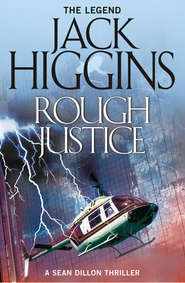По всем вопросам обращайтесь на: info@litportal.ru
(©) 2003-2024.
✖
Flight of Eagles
Автор
Год написания книги
2018
Настройки чтения
Размер шрифта
Высота строк
Поля
‘Don’t apologize for him.’ She put down her glass. ‘That isn’t the man I married. He’s back there in those Godforsaken trenches. He never got out.’
Which wasn’t far from the truth, for in the years that followed, Jack Kelso acted as if he didn’t care if he lived or died. His exploits on automobile-racing circuits were notorious. He still flew, and crash-landed on three occasions. He even used his motor yacht to run booze during Prohibition, and his capacity for drink was enormous.
One thing that could be said for him, however, was that he treated his wife with grave courtesy. For her part, Elsa played the good wife, the elegant hostess, the affectionate mother. She was always Mutti to Max and Harry, taught them French and German, and they loved her greatly, and yet their affection for their drunken war-hero father was even greater.
He’d managed to buy a Bristol fighter and kept it at a small flying club outside of Boston that was owned by another old air ace from RFC days, named Rocky Farson. The boys were ten the day Jack strapped them into the rear cockpit and took them for a flight. Their birthday treat, he called it. The boys loved it and Elsa threatened to leave him if he ever did such a thing again.
Abe, as usual, was the man in the middle, trying to keep the peace, on her side because Jack had been drunk, but since Jack was rich in his own right, there was no controlling him.
Nineteen twenty-eight and 1929 came. Disillusioned not only with her marriage but with America, Elsa had only her sincere friendship with Abe and her love of the boys to sustain her. They were, of course, totally alike: their straw-blond hair and green eyes, their high German cheekbones, their voices, their mannerisms. No individual blemishes or birthmarks set them apart. Most times, even she couldn’t tell them apart, and neither could Abe. It was a constant sport for them to change roles and make fools of everyone. Totally bonded, the only thing they ever argued about was who owned Tarquin. The fact that Max, as the eldest by ten minutes, was legally Baron von Halder never bothered them.
It was the summer of 1930 when the tragedy happened. Jack Kelso was killed when his Bentley spun off a mountain road in Colorado and fireballed. What was left of him was brought back to Boston, where Abe, now a Congressman, presided over the funeral. The great and the good were there, even the President, the twins in black suits on either side of their mother. They seemed strangely still, frozen almost, and older than their twelve years.
Afterwards, at the big house when everyone had left, Elsa sat by the open French window in the drawing room, elegant in black, and sipped a brandy. Abe stood by the fire.
‘Now what?’ he asked. ‘It’s a bleak prospect.’
‘Not for me,’ she replied. ‘I’ve done my bit. I was a good wife for years, Abe, and put up with a hell of a lot. I want to go back to Germany.’
‘And live on what? Most of the fortune his mother left is gone. Sad to say, there’s not much coming to you in his will, Elsa, you know that.’
‘Yes, I know,’ she said. ‘But you’ve got millions. More than you know what to do with. You could help me, Abe.’
‘I see.’
‘Abe, we’ve always been good friends. Let me go home. I’ll restore the estate, I’ll restore the family name.’
‘And take my grandsons with you?’ He shook his head. ‘I couldn’t bear that.’
‘But they’re my sons, too, they belong with their mother. And Max – Max is the Baron von Halder. You can’t make him give that up, Abe, it wouldn’t be right, it wouldn’t be just. Please, Abe, I’m begging you.’
Abe Kelso sat for several long moments, the air thick with regret and loss. Finally, he spoke.
‘I’ve often worried about it, you know – what would happen when Max was old enough to appreciate the title. Would he move away to claim it, leave us all here? I always thought I’d have at least a few more years before it came to that, but –’ He stopped and sighed. ‘But with Jack dead, and you wanting to leave, there’s not much of us left, is there?’ He smiled sadly. ‘You’re right, Elsa. Max does deserve that chance. And so do you. But on one condition.’ Here his voice became firm and strong. ‘Harry stays here. I won’t give up both my grandsons, I couldn’t possibly agree to that. I’ll give you what you need to restore the von Halder estate – but Harry stays with me. Are we agreed?’
She didn’t even argue. ‘Agreed, Abe.’
‘Okay. We can sort out the details later about visitation, schooling and the rest. The only thing that worries me is how the boys will feel about this.’
‘I’ll talk to them.’
‘No, let me first. Ask them to come to my study, would you?’
Later that evening before dinner, when she went back to the drawing room, Max and Harry were surprisingly calm, but then they’d always been like that: alone, cool, detached, on the outside looking in. Although they loved their mother, they were aware of her inner selfishness, so the latest turn of events came as no real surprise. She kissed them in turn.
‘Your grandfather has told you?’
‘Of course. They understand,’ Abe said. ‘Took it surprisingly well. The only problem, it seems, was who was to take possession of Tarquin, but he stays here. That bear sat in the bottom of the cockpit on every flight Jack made.’ For a moment, he seemed lost in thought then he straightened up. ‘Champagne,’ he said. ‘Half a glass each. You’re old enough. Let’s drink to each other. We’ll always be together one way or another.’
The boys said nothing, simply drank their champagne, old beyond their years, as usual, as enigmatic as Tarquin the bear.
The Germany to which Elsa von Halder returned was very different from what she remembered – unemployment, street riots, the Nazi party beginning to rear its head – but she had Abe’s money, so she put Max into school and set about regenerating the von Halder estate. There was Berlin society, of course. One of her father’s oldest friends, the fighter ace from the war, Hermann Goering, was a coming man in the Nazi party, a friend of Hitler’s. As an aristocrat, all doors, were open to him and Elsa, beautiful and rich and an undeniable aristocrat herself, was an absolute asset to the party. She met them all – Hitler, Goebbels, Ribbentrop – and was the toast of café society.
Hitler assumed power in 1933, and Elsa allowed Max to go to America for six months in 1934 to stay with his grandfather and brother, who was a day student at prep school. Abe was overjoyed to see him. As for the brothers, it was as if they’d never been apart, and on their birthday Abe gave them a special present. He took them out to the airfield their father used to fly from, and there was Rocky Farson, older, a little heavier, but still the old fighter ace from the Western Front.
‘Rocky’s going to give you a few lessons,’ Abe said. ‘I know you’re only sixteen, but what the hell. Just don’t tell your mother.’
Rocky Farson taught them in an old Gresham biplane. Someone had enlarged the rear cockpit to take mail sacks, which meant there was room to squeeze them both in. Of course, he also flew with them individually, and discovered that they were natural-born pilots, just like their father. And, just like their father, whoever was flying always had Tarquin in the cockpit.
Rocky took them way beyond normal private pilot skills. He gave them classroom lessons on dogfighting. Always look for the Hun in the sun, was a favourite. Never fly below 10,000 feet on your own. Never fly straight and level for more than thirty seconds.
Abe, watching one day, said to Rocky after they’d landed, ‘Hell, Rocky, it’s as if you’re preparing them for war.’
‘Who knows, Senator?’ Rocky said, for indeed that was what Abe Kelso was now. ‘Who knows?’
So brilliant were they that Rocky used the Senator’s money to purchase two Curtis training biplanes, and flew with each of them in turn to take them to new heights of experience.
During the First World War, the great German ace Max Immelmann had come up with a brilliant ploy that had given him two shots at an enemy in a dogfight for the price of one. It was the famous Immelmann turn, once practically biblical knowledge on the Western Front, now already virtually forgotten by both the US Air Corps and the RAF.
You dived in on the opponent, pulled up in a half-loop, rolled out on top and came back over his head at fifty feet. By the time he’d finished with them, the boys were experts at it.
‘They’re amazing – truly amazing,’ Abe said to Rocky in the canteen at the airfield.
‘In the old days, they would have been aces. A young man’s game, Senator. I knew guys in the Flying Corps who’d been decorated four times and were majors at twenty-one. It’s like being a great sportsman. You either have it or you don’t, that touch of genius, and the twins have it, believe me.’
The boys stood at the bar talking quietly, drinking orange juice. Abe, watching them, said, ‘I think you’re right, but to what purpose? I know there are rumbles, but there won’t be another war. We’ll see to that.’
‘I hope so, Senator,’ Rocky said, but in the end, it wasn’t to matter to him. He had the old Bristol refurbished, took it up for a proving flight one day, and lost the engine at 500 feet.
At the funeral, Abe, standing to one side, looked at the boys and was reminded, with a chill, that they looked as they had at their father’s funeral: enigmatic, remote, their thoughts tightly contained. It filled him with a strange foreboding. But there was nothing to be done about it and the following week, he and Harry took Max down to New York and saw him off on the Queen Mary, bound for Southampton in England, the first stage of his return to the Third Reich.
EUROPE
1934–1941
4
Max sat on the terrace of their country house with his mother, and told her all about it – the flying, everything – and produced photos of himself and Harry in flying clothes, the aircraft standing behind.
‘I’m going to fly, Mutti, it’s what I do well.’
Looking into his face, she saw her husband, yet, sick at heart, did the only thing she could. ‘Sixteen, Max, that’s young.’
‘I could join the Berlin Aero Club. You know Goering. He could swing it.’
Which was true. Max appeared by appointment with Goering and the Baroness in attendance, and in spite of the commandant’s doubts, a Heinkel biplane was provided. A twenty-three-year-old Luftwaffe lieutenant who would one day become a Luftwaffe general was there, named Adolf Galland.
‘Can you handle this, boy?’ he asked.











